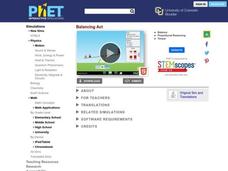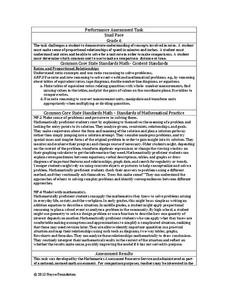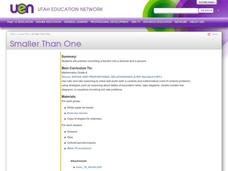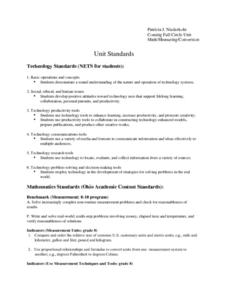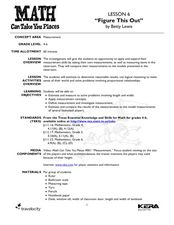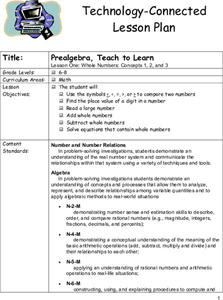PHET
Balancing Act
How can a teeter-totter balance when the two people are different sizes? Show classes how this works through a simulation. Scholars play with a teeter-totter to show how different masses and their placement affect balance. Once they have...
EngageNY
Part of a Whole as a Percent
Pupils use visual models, numeric methods, and equations to solve percent problems. To complete the second installment of 20, they find the part given the percent and the whole, find the percent given the part and the whole, and find the...
Noyce Foundation
Snail Pace
Slow and steady wins the race? In the assessment task, scholars calculate the rates at which different snails travel in order to find the fastest snail. Hopefully, your class will move much more quickly in finishing the task!
Curated OER
Building Sets of 13 and 14
Compose and decompose sets of 13 and 14 and compare sets of each with your little learners. They use objects to construct sets of 13 and 14, record their answers, and compare sets in several different ways.
Curated OER
Shots, Standings, and Shopping
Rates and ratios can easily be applied to real-world situations. Learners explore a series of websites in order to procure comparable data. They define ratios and rates, view videos, and use the internet to explore how ratios and rates...
Illustrative Mathematics
Running at a Constant Speed
The learner must use the given constant speed to find the unit rate. A table is made in order to relate the speed to the time and the distance. From the table, learners are able to see the unit rate in miles per minute and miles per...
Virginia Department of Education
Dilation
Open up your pupils' eyes and minds on dilations. Scholars perform dilations on a trapezoid on the coordinate plane. They compare the image to the preimage and develop generalizations about dilations.
Alabama Learning Exchange
Writing Equations for Parallel Lines
Acquaint your class with the concept of parallel lines. Learners watch a PowerPoint presentation about how to write equations of parallel lines. Their understanding of linear equations and slope is taken a step further by the exercises...
Curated OER
The Stained Glass Window
Students use centimeter rulers and the attached worksheet containing a scale drawing of a stained glass window. The actual measurements of the stained glass window are given, and students are asked to find the actual measurement of the...
Curated OER
Order of Operations
Ninth graders investigate the order of operations. In this Algebra I lesson, 9th graders explore the rules of arithmetic and algebra as they review and practice simplifying increasingly complex numeric expressions using the order of...
Curated OER
Mine Shaft Grade 8 Slope
Eighth graders investigate slopes using real life scenario. In this algebra lesson plan, 8th graders model and interpret real life data. They plot their data in a coordinate plane and discuss the results with the class.
Curated OER
Sizing Up the Supersize Croc
Learners examine and compare traits of humans and crocodiles. In this crocodile lesson students use a ratio to estimate the height of a person and compare that to a crocodile.
Curated OER
Measuring the Flagpole
Studets practice problem solving and comparison of quantities, ratios and prproportions. They develop a plan for determining the height of a flagpole complete with drawings and calculations. In addition, they complete a written...
Curated OER
What Do We Do With A Dirty Bomb?
Students examine composition of dirty bomb and its possible effects on a city, and investigate simulations of such an event; students use computational and problem solving skills to assess damage and prepare report proposing solution to...
Curated OER
Smaller Than One
Sixth graders practice converting a fraction into a decimal and a percent. They explain relationships among rational numbers. They order and compare whole numbers, fractions (including mixed numbers), and decimals using a variety of...
Curated OER
Making Games
Sixth graders participate in a variety of the following math games to practice problem solving: Factor Capture, Garbage Can Basketball, Equivalent Fraction Capture, and Equivalent Spoons. They practice problem solving involving multiple...
Curated OER
Metric Olympics
Students participate in a Metric Olympics event and use metric measurements to measure actual performances in their events. They throw a plastic straw for a javelin event, participate in a long jump and high jump event, and a variety of...
Curated OER
Figure This Out
Students measure different parts of the human body. In this measurement lesson, students work in pairs to take measurements of human measurements which include: arm span, height, foot length, and wrist to longest finger. They also...
Curated OER
Whole Numbers
Student are assigned one of the sections on whole numbers. After reviewing the content, they teach their assigned sections to other class mates. They publish their findings on a PowerPoint slide show to use when they teach their section.
Curated OER
Texas History Math
Seventh graders practice math skills while they become familiar with Texas' Boom & Bust economy and the natural history of the east Texas Piney Woods.
Curated OER
Capacity
Eighth graders explore the term capacity and understand the word's meaning. They participate in several lab stations set up around the room in which they will estimate how many scoops it will take to fill the container. They then will...
Curated OER
A Newspaper?
Sixth graders use newspapers to investigate fractions. They work in small groups to categorize articles, measure them with the grid transparency, and calculate the values represented. Afterward, they write a reflective essay on the role...
Curated OER
Playing with Remainders
Fifth graders explore how people handle remainders in real life. For this remainders math lesson, 5th graders participate in skits to show what to do with remainders. Students complete worksheets with word problems.
Curated OER
West Nile Virus and Lyme Disease: Making Sense of the Numbers
In an interdisciplinary exploration, trace the development of West Nile fever and Lyme diseases. Pupils discover how these diseases are contracted. They collect statistical data and analyze trends.


